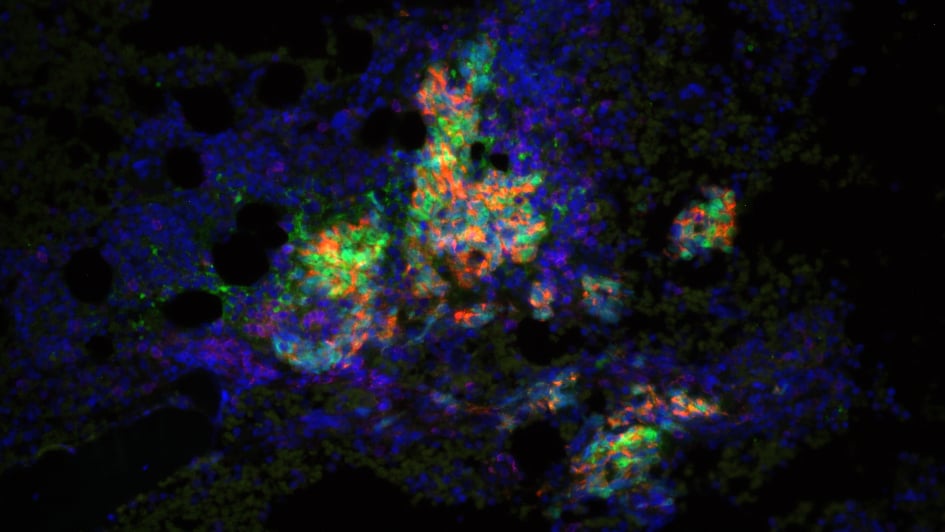
A new high-tech drug treatment for prostate cancer, which delivers a precisely targeted dose of radiation to cancer cells, can keep patients alive and healthy for longer, a new phase III trial reports.
The ‘search and destroy’ treatment could shrink tumours while leaving healthy cells unharmed and has the potential to change the current standard of care for some men with advanced prostate cancer.
The treatment, known technically as 177Lu-PSMA-617, uses a ‘homing device’ to seek out cancers by detecting the presence of a target molecule called prostate-specific membrane antigen (PSMA) on the surface of cancer cells. Once in contact, it delivers a radioactive payload to kill them.
The new results from the VISION trial, led by an international group including researchers at The Institute of Cancer Research, London and The Royal Marsden NHS Foundation Trust, as well as the Memorial Sloan Kettering Cancer Center in the US, will be presented at the American Society of Clinical Oncology (ASCO) virtual annual meeting.
We have made huge progress in cancer treatment over the years, but there continue to be cancers that have poor survival rates, such as advanced bowel cancer, the second most common cause of cancer death in the UK. Your support today will help us develop smarter treatments for bowel cancer patients and give these patients hope for the future.
Make a donation
Adding 177Lu-PSMA-617prolongs survival
The target for the new treatment – a protein molecule called prostate-specific membrane antigen, or PSMA – is present at increased levels on the surface of cancer cells in some prostate cancer patients, and it is these men who can benefit from the treatment.
The clinical trial involved 831 participants with PSMA-positive advanced prostate cancer who had previously received at least one targeted hormone treatment – such as enzalutamide or abiraterone – alongside taxane chemotherapy.
Adding 177Lu-PSMA-617 to standard care extended patients’ lives by an average of 4 months. The median overall survival for patients who received 177Lu-PSMA-617 was 15.3 months compared with 11.3 months for those who received the standard of care alone.
Keeping cancer in check for longer
The treatment also kept patients’ cancers in check for longer. The median length of time before patient’s cancer got worse, known as progression-free survival, was 8.7 months for those who were treated with 177Lu-PSMA-617 compared with 3.4 months for those treated with standard of care alone. The treatment was also well tolerated – with few patients reporting significant side effects.
Overall, men who received the new treatment were 38 per cent less likely to die during the 20.9-month follow-up than those who received the current standard of care alone.
It is estimated that a third to a half of the 10,000 men a year diagnosed with advanced prostate cancer have tumours with high levels of PSMA and could therefore benefit from the treatment.
Understanding who is likely to respond
The amount of PSMA on the surface of cancer cells is more than four times higher in tumours where there are also faults in DNA repair genes. This is because PSMA plays a key role in keeping the genome in cells stable and researchers believe that tumours produce it as a survival mechanism where they are defective in repairing their DNA.
Two years ago, researchers at the ICR discovered that they could test for genetic faults in DNA repair genes as a first-stage screen to pick out patients who are likely to benefit from PSMA-targeted treatment.
Today’s highly anticipated findings are the first to show that the new ‘search and destroy’ treatment can prolong survival in these men.
'A guided missile'
Study co-author Professor Johann de Bono, Professor of Experimental Cancer Medicine at The Institute of Cancer Research, London, and Consultant Medical Oncologist at The Royal Marsden NHS Foundation Trust, said:
“This new treatment acts like a guided missile – seeking out cancer cells with high levels of the PSMA molecule on their surfaces. It combines a potent radioactive medicine with a ‘homing signal’ that searches for tumour cells and binds to them, delivering radiation precisely to destroy the cancer.
“Our findings show that patients whose tumours have high levels of PSMA can benefit from this highly innovative ‘search and destroy’ treatment and I believe that these results can change the standard of care for some men with advanced prostate cancer.”
'A smarter, kinder treatment'
Professor Paul Workman, Chief Executive of The Institute of Cancer Research, London, said:
“Highly innovative treatments like this are crucial if we are to open up new options for patients with advanced cancer. By delivering radiation in a highly precise way, this is a smarter, kinder treatment, with the potential to improve men’s survival while reducing the risk of side effects.
“It was scientists at the ICR who discovered that testing for DNA repair defects is a good indication of which tumours have high levels of PSMA and therefore which patients are most likely to benefit from the ‘search-and-destroy’ medicine. It’s excellent to see that this cutting-edge new technology, informed by pioneering science, can indeed extend men’s lives.”
The Prostate Cancer Foundation funded part of the research carried out at the ICR. Prostate Cancer Foundation President and CEO Jonathan W. Simons, MD, said:
"This is an incredible moment for men with advanced prostate cancer and their families. The VISION trial demonstrates what's possible with precision medicine: we can send a radioactive isotope directly at prostate cancer cells to eradicate them wherever they are in the body. We've come so far since PCF first began funding research into PSMA more than 25 years ago – essentially, we've created an entirely new pillar of treatment – with low side effects – for men with advanced disease."